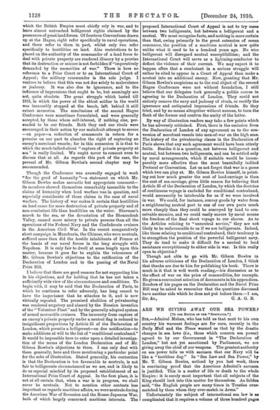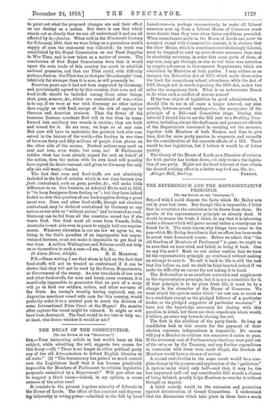ARE WE GIVING AWAY OUR SEA POWER P
[TO THE EDITOR OY THE " SPECTATOR:1
SIlt,—Admiral Mahan, who has told us that next to his own country his warmest feelings are for ours, recently in the Daily Hail and the Times warned us that by the drastic changes in sea laws (i.e., those which concern sea power) agreed to by our Government in "The Declaration of London," but not yet sanctioned by Parliament, we are giving away the chief of our weapons. The greatest authority on sea power tells us with sarcasm that our Navy will be like a "toothless dog." In "Sea Law and Sea. Power," by Mr. T. Gibson Bowles, noticed by you last week, there is convincing proof that the American Admiral's sarcasm is justified. This is a matter of life or death to the whole Empire : it is surely most important that all subjects of the King should look into this matter for themselves. As Selden said, " the English people are many times in Treaties over. matched by them whom they over-match in Arms."
Unfortunately the subject of international sea law is so complicated that it requires a volume of three hundred pages
to point out what the proposed changes are and their effect on our destiny as a nation. But there is one fact which stands out so clearly that we can all understand it and are all affected by it,—famine. When told in the Nineteenth Century for February, 1896, that we were living on a precarious week's supply of corn the statement was ridiculed; its truth was established by the Royal Commission on our Food Supplies in'War Time, and is now taken as a matter of course. The conclusions of that Royal Commission were that it would upset the corn trade of this country too much to establish national granaries, and that our Fleet could, with difficulty perhaps, feed us. Our Fleet was, in that pre-`Dreadnought' time, relatively far stronger than it is now, or will presently be.
Fourteen years ago it had not been suggested by Germany, and provisionally agreed to by this country, that corn and all food-stuffs should be included among those other things, shot, guns, armour, &c., which are contraband of war,—that is to say, if we were at war with Germany no other nation dare supply us with food, except at the risk of capture by German and Austrian cruisers. That the flower of the immense German merchant fleet will in war time be trans- formed into auxiliary war vessels is certain; they are built and armed for it. So are ours; we hope so at any rate. But ours will have to undertake the greatest task ever con- ceived in the history of the world,—the feeding in war time of between forty and fifty millions of people from places on the other side of the oceans. Neutral nations may send us coal and iron, even water, but corn, no! If Parliament ratifies what has been already signed for and on behalf of the nation, then the nation with its own hand will possibly have signed its death-warrant, and given to Germany the only ally she will want,—famine.
The fact that corn and food-stuffs are not absolutely included in the list of articles which in war time become ipso facto contraband, such as guns, powder, &c., will make little difference to us. Our business, as Admiral Blake said in 1653, is " to keep foreigners from fooling us " ; but they have indeed fooled us over this question of our food-supplies during a great naval war. Corn and other food-stuffs, though not absolute contraband, may be declared contraband by Germany or any nation at war with us " without notice," and be treated as such. Germany can be fed from all the countries round her if she wants food. Our food must all come from Canada, India, Australia !—not able even in peace to supply half our require- ments. Whatever alteration in our sea law we agree to, we, living in the fool's paradise of an impregnable but unpro- visioned fortress, must not make it impossible to get food in war time. A million Wellingtons and Nelsons could not help us or themselves in such a case.—I am, Sir, &e., P.S.—Since writing I see that stress is laid on the fact that food-stuffs will not be treated as contraband if it can be shown that they will not be used by the forces, Departments, or Government of the enemy. As over two-thirds of our corn and other food-stuffs, for man and beast, come overseas, it is manifestly impossible to guarantee that no part of a cargo will go to feed our soldiers, sailors, and other servants of the State. An enemy's warship having captured, say, an Argentine merchant vessel with corn for this country, would probably order it to a neutral port to await the decision of some International Prize Court at the Hague! Six months after capture the vessel might be released. It might as well have been destroyed. The food would be too late to help us ; at least, who knows whether it would or not P







































 Previous page
Previous page